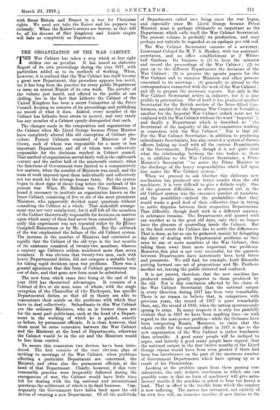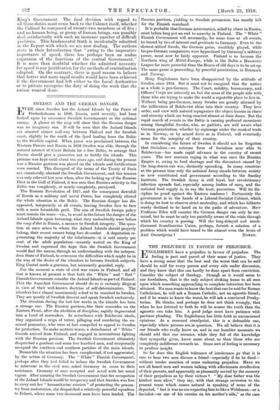THE ORGANIZATION OF THE WAR CABINET.
THE War Cabinet has taken a step which at first sight strikes one as peculiar. It has issued an elaborate Report of its own proceedings during the year 1917, with particulars added as to its methods of working. When, however, it is realized that the War Cabinet has itself become a great new Department, this procedure appears less novel, for it has long been the practice for every public Department to issue an annual Report of its own work. The novelty of the volume just issued, and offered to the public at one shilling, lies in the fact that hitherto the Cabinet of the United Kingdom has been a secret Committee of the Privy Council, keeping no minutes of its proceedings and publishing no record of what it does. Indeed, every member of the Cabinet has hitherto been sworn to secrecy, and very rarely has any member of a Cabinet openly disregarded that oath.
The changes made in the composition and organization of the Cabinet when Mr. Lloyd George became Prime Minister have completely altered this old conception of Cabinet pro- cedure. Former Cabinets consisted of Ministers of the Crown, each of whom was responsible for a more or less important Department, and all of whom were collectively responsible for the decisions reached in Cabinet council. That method of organization served fairly well in the eighteenth century and the earlier half of the nineteenth century, when the functions of Government were limited to a comparatively few matters, when the number of Ministers was small, and the mass of work imposed upon them individually and collectively not too much for the average human brain. But the system began to show signs of decay long before the outbreak of the present war. When Mr. Balfour was Prime Minister, he found. it necessary to institute an organization known as the Inner. Cabinet, consisting of five or six of the most prominent Ministers, who apparently decided many questions without consulting the Cabinet as a whole. That makeshift arrange- ment was not very satisfactory, for it still left all the members of the Cabinet theoretically responsible for decisions on matters upon which many of them had never been consulted. Appar- ently this experiment was not repeated either by Sir [Henry Campbell-Bannerman or by Mr. Asquith.. But the outbreak of the war emphasized the failure of the old Cabinet system. The increase in the number of Ministers had continued so rapidly that the Cabinet of the old type in the last months of its existence consisted of twenty-two members, whereas a century ago Cabinets seldom numbered more than seven members. It was obvious that twenty-two men, each with heavy Departmental duties, did not compose a suitable body for taking rapid decisions upon war problems. There was a general agreement that this form of Cabinet government was out of date, and that aome new form must be substituted.
The new form which came into being at the end of the year 1916 has theoretical advantages. It consists of a Cabinet of five or six men, none of whom, with the single exception of the Chancellor of the Exchequer, has specific Departmental duties, so that all in theory are able to concentrate their minds on the problems with which they have to• deal collectively. Subordinate to this War Cabinet are the ordinary Ministers, who as in former times are for the most part politicians, each at the head of a Depart- ment in the working of which he is guided, exactly as before, by permanent officials. It is clear, however, that there must be• some connexion 'between the War Cabinet and the Ministers at the head, of Departments, otherwise the Cabinet would be in the air and the Ministers would be free from control.
To secure this connexion two devices have been intro- duced. The first consists of the very obvious plan of inviting to meetings of the War Cabinet, when problems affecting a. particular Department are concerned, the Minister, and often also the permanent officials, at the head of that Department. Clearly, however, if this very reasonable practice were frequently followed during the emergencies of war, the Cabinet would have little time left for dealing with the big national and international questions the settlement of which. is its final business. Con- seqpently the Government have fallen back upon the old device of creating a new Department. Of all the multitude of Departments called into being since the war began, and especially since Mr. Lloyd George became Prime Minister, none is perhaps ultimately so important as the Department which calls itself the War Cabinet Secretariat. The present volume is probably its production, and may perhaps not unfairly be regarded as an apologia pro rid sud.
The War Cabinet Secretariat consists of a secretary, Lieutenant-Colonel Sir M. P. A. Hankey, with ten assistant- secretaries, and an office establishment at 2 White- hall Gardens. Its business is (1) to keep the minutes and record the proceedings of the War Cabinet ; (2) to pass on to the different Departments the decisions of the War Cabinet ; (3) to prepare the agenda papers for the War Cabinet and to summon Ministers and other persons concerned to its meetings ; (4) generally to attend to the correspondence connected with the work of the War Cabinet ; and (5) to prepare the necessary reports. Not only is the War Cabinet Secretariat active in industry, but it is also prolific in procreation. Out of itself it has produced another Secretariat for the British section of the Inter-Allied Con- ferences, another for the Supreme War Council at Versailles, another for the Imperial War Cabinet (which must not be confused with the War Cabinet without the word " Imperial and finally a Department which is described as " the Secretariat of the majority of the sub-committees working in connexion with the War Cabinet." Nor is that all. For the War Cabinet Secretariat, in addition to producing subordinate Secretariats, has also created a system of liaison officers linking up itself with all the various Departments of the Government. Finally, though it is not quite clear what the relationship between the two bodies is, there is, in addition to the War Cabinet Secretariat, a Prime Minister's Secretariat " to assist the Prime Minister in the discharge of the heavy responsibilities which fall upon him under the War Cabinet system." When we proceed to ask whether this elaborate new mechanism has produced any better results than the old machinery, it is very difficult to give a definite reply. One of the greatest difficulties, as above pointed out, in the old Cabinet system was the excessive number of members, and the possibility—indeed the probability—that they would waste a good deal of their collective time in trying to settle disputes between their respective Departments. That difficulty, though dealt with in a different manner, in substance remains. The Departments still quarrel with one another as in the good old days, only they no longer have the pleasure of quarrelling inside the Cabinet. But in the final resort the Cabinet has to settle the differences. That is done, as fax as can be gathered, mainly by delegating the duty of dealing with Departmental problems as they arise to one or more members of the War Cabinet, thus taking them away from more important war problems. Moreover, this plan is not very successful, for the quarrels between Departments have notoriously been both bitter and persistent. We still find, for example, Lord Rhondda putting forward one set of propositions and Mr. Prothero another set, leaving the public irritated and confused.
It is not proved, therefore, that the new machine has produced results greatly superior to those produced by the old. Nor is this conclusion affected by the claim of the War Cabinet Secretariat that the national output in every direction during 1917 has been very remarkable. There is no reason to believe that, in comparison with previous years, the record of 1917 is more remarkable than, say, the record of 1915, when the nation spontaneously sprang to arms. In many respects it is only too painfully evident that in 1917 we have been marking time—as with regard to the man-power problem—while the Germans have been conquering Russia. Moreover, to claim that the whole credit for the national effort in 1917 is due to the new organization of the War Cabinet is rather bombastic than scientific. A good many people will be inclined to argue, and latterly a good many people have argued, that the national output in the first twelve months of the Lloyd George regime would have been even greater if there had been less interference on the part of the enormous number of Government Departments which have sprung up as a result of his Premiership. Looking at the problem apart from these passing con- siderations, the only definite conclusion to which one can possibly come is that no form of machinery will give satis- factory results if the machine is asked to bear too heavy load. That in effect is the trouble from which the country is now suffering. The nation has entrusted, not entirely of its own free will, an immense number of new duties to the King's Government. The final decision with regard to all these duties must come back to the Cabinet itself, whether the Cabinet be composed of twenty-two members or of five ; and no human being, or group of human beings, can possibly deal satisfactorily with such an immense number of difficult problems. This fundamental truth is incidentally admitted in the Report with which we are now dealing. The authors state in their Introduction that " owing to the imperative importance of speed, there has perhaps been an undue expansion of the functions of the central Government." It is more than doubtful whether the admitted necessity for speed is any justification for the methods of centralization adopted. On the contrary, there is good reason to believe that better and more rapid results would have been achieved if the Government had left either to the Local Authorities or to private enterprise the duty of doing the work that the nation wanted done.



































 Previous page
Previous page